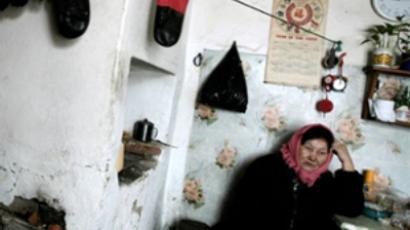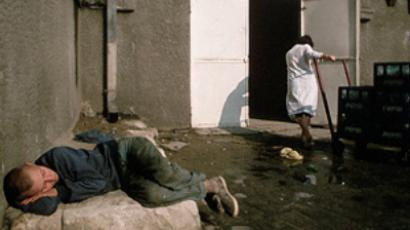Kalashnikov producer to pay wages in sugar

Mounting salary debts are forcing some companies to resort to radical moves in a bid to quell uproar. An arms factory in the Kirov region in central Russia has decided to hand over food to employees instead of money.
The Molot company, which produces small arms including Kalashnikov submachine guns and munitions, has no money to pay the $US 3.6 million it owes the workers, so the managers decided to help them with something to eat instead, reports Kommersant daily.
Food packages include oil, powder, pasta, grits, sugar, and canned beef stew. The cost of the package is only a fifth of an average salary, but despite this, more than 10% of the 5,000 people working at Molot applied for the programme. The factory is located in the town of Vyatskiye Polyany, and is the main employer there, accounting for a third of jobs in the area.
The situation is unique because Molot was the first company to publicly admit paying wages in food, Konstantin Makarenko, from the Centre for analysis of strategies and technologies, told the newspaper.
“The trouble would come if Molot starts paying with its own products,” he commented.
The company is among many specializing in defense contracts in Russia, which face cash- flow problems in times of financial crisis. Their problem is the niche market with a lot of restrictions and decreasing volume.
Adding to this is the confusion over Russia’s new budget currently being considered by the parliament. Until the budget is approved, the Defence Ministry cannot launch procurement tenders, and pay for products and services of the industry.
Navy protests
The problem has already led to protests at several companies servicing Russia’s Northern Navy. On April 2, 120 workers at a ship repair factory SRZ-82 refused to work if they are not paid arrears of wages for 5 months, as local TV station ‘Murman’ reported. The factory is the only place in Russia with facilities to repair super large-tonnage vessels such as the only air carrier in the Russian Navy ‘Admiral Kuznetsov’.
Discontent among employees of other defense companies in the region is also growing. The head of the local union of workers of the Northern Fleet service companies, Valery Kudryavtsev, said employers owed them a total of $US 3.5 million. The union said the workers will start large-scale protests on Friday of this week if the situation is not changed.
On Wednesday, the Defence Ministry announced it has transferred some $US 1.2 million to the Northern Fleet accounts as an emergency measure. The fleet command allocated some money from its reserves as well. The move may lower the tension, but media reports suggest similar problems plague the entire defense industry.
Flawed regulations
Many experts and people in the industry say the budget crisis, which interrupted cash flows this year, simply highlighted the problems in the Russian military procurement system.
Russian law requires all state companies and agencies to purchase goods and services through public tenders, and pricing is the main factor in choosing contractors. The law is meant to fight corruption, but experts say it harms certain defence companies with a unique profile. The only factory in the country that can repair nuclear warships won’t have customers outside Russia’s Navy, and the Navy won’t find another contractor to do the job simply because there is none, they argue. Holding a tender for such cases is plainly ill-advised and costs time and money.
The law may even lead to the very corruption it should prevent, Kudryavtsev claimed in an interview with Komsomolskaya Pravda. According to him, some military contracts are given to front companies that end up sub-contracting them to the defence plants. The plant can’t refuse the scheme because there is no other contract to take, but it is forced to collect a minimal fee for it. The intermediary essentially steals profits from the company.
"They make money out of thin air," the union activist said.
Ministry opens coffers
So far, 70% of the defence budget has been allocated, totalling about $US 9 billion, head of procurement service Vladimir Popovkin told journalists on Friday. The rest will be distributed by the end of Apri.
He added that $US 3.8 billion were transferred to contractors in advance to help them cope with the global financial crisis.
“Taking into account the difficult situation in the economy, the state’s defence contracts now have a social and an economic function. Pouring this money into the economy is a real support for defence plants,” he said.














